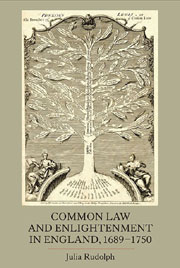Book contents
- Frontmatter
- Contents
- Acknowledgements
- Abbreviations
- 1 Against Decline
- 2 Law Books, Legal Knowledge and Enlightened Encyclopedism
- 3 Expertise and Evidentiary Practices in Science and Law
- 4 Common Law, Credit and the Growth of Commerce
- 5 Common Law Jurisprudence and the Philosophy of Natural Law
- 6 Common Law and the Morality of Markets
- 7 Legal Histories and Enlightened Historiography
- Conclusion
- Bibliography
- Index
- STUDIES IN EARLY MODERN CULTURAL, POLITICAL AND SOCIAL HISTORY
1 - Against Decline
Published online by Cambridge University Press: 05 May 2013
- Frontmatter
- Contents
- Acknowledgements
- Abbreviations
- 1 Against Decline
- 2 Law Books, Legal Knowledge and Enlightened Encyclopedism
- 3 Expertise and Evidentiary Practices in Science and Law
- 4 Common Law, Credit and the Growth of Commerce
- 5 Common Law Jurisprudence and the Philosophy of Natural Law
- 6 Common Law and the Morality of Markets
- 7 Legal Histories and Enlightened Historiography
- Conclusion
- Bibliography
- Index
- STUDIES IN EARLY MODERN CULTURAL, POLITICAL AND SOCIAL HISTORY
Summary
The history of eighteenth-century English common law jurisprudence – and common law culture more generally – has often been narrated as a story of decline and fall. The first half of the century, a period delineated between the Bill of Rights of 1689 and the labours of Blackstone in the 1760s, has particularly been characterised as a time when the common law stood apart from the progressive and enlightened impulses of the era; a time when common law struggled, and largely failed, to maintain its former intellectual and cultural significance. Since this is a narrative that adheres to the pattern of Polybius' cycles – wherein decay invariably succeeds a period of strength and perfection – it relies on the convention of a reversal of fortune, and depicts the century preceding 1689 as a peak in the development of key common law principles. The seventeenth century, an age of Coke, Selden and Hale, is regarded as a triumphal period for the common law, when a language of ancient custom, and a theory of historicised legal authority, flourished and expanded in important ways. By the eighteenth century, however, scholarly convention holds that English common law jurisprudence and common law culture went into a period of defensiveness, irrelevance and ultimate decline. Its practitioners were no longer at the centre of English cultural life; its arguments for custom and precedent were ultimately and fatally outstripped by new discourses and practices of rational contract, legislative change and commercial interest.
- Type
- Chapter
- Information
- Common Law and Enlightenment in England, 1689-1750 , pp. 1 - 29Publisher: Boydell & BrewerPrint publication year: 2013

